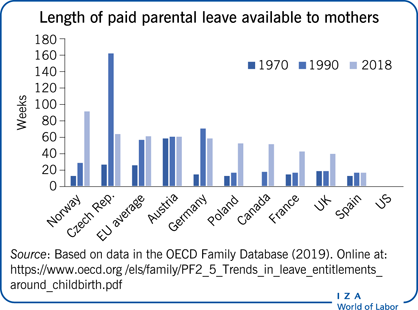Elevator pitch
Numerous studies have investigated whether the provision and generosity of parental leave affects the employment and career prospects of women. Parental leave systems typically provide either short unpaid leave mandated by the firm, as in the US, or more generous and universal leave mandated by the government, as in Canada and several European countries. Key economic policy questions include whether, at the macro level, female employment rates have increased due to parental leave policies; and, at the micro level, whether the probability of returning to work and career prospects have increased for mothers after childbirth.

Key findings
Pros
Parental leave increases the family–work balance.
Workers are protected from losing their jobs due to parental leave policies.
Workers’ and firms’ investment in firm-specific human capital is protected through job-protected leave.
The likelihood that workers return to the same employer after parental leave is higher if the leave period is not too long (i.e. not more than one year).
The introduction of parental leave quotas for fathers has helped create incentives for employers to grant paternal leave, and for fathers to take it.
Cons
There is some evidence that entitlement to prolonged leave longer than one year negatively affects employment rates and careers.
Career interruptions due to parental leave can lead to detachment from work and human capital depreciation, especially with longer leave durations.
Losses in terms of wages and human capital depreciation from parental leave are higher for highly educated than for low or medium educated parents.
Evidence of discrimination against women and mothers in some areas of work exists; parental leave policies represent one potential explanatory factor.